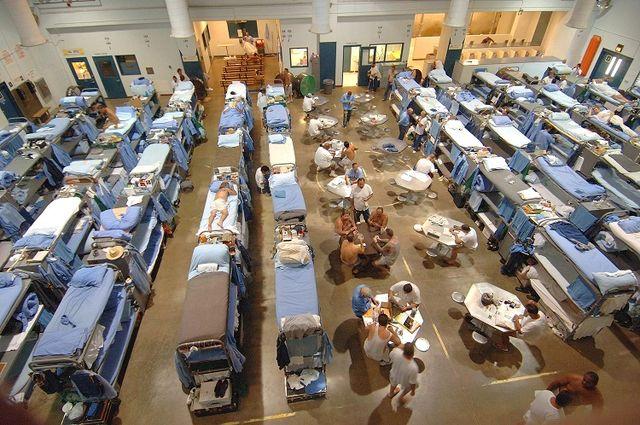
The private prison industry is a $5 billion business, but a recent decision by the U.S. Department of Justice (DOJ) has signaled that this controversial business could be on the decline. Last Thursday, Deputy Attorney General Sally Q. Yates instructed the Bureau of Prisons (BOP) to reduce its reliance on privately run prisons. As each prison contract approaches the end of its term, the BOP has been instructed to either decline to renew or reduce that agreement’s scope.
The news on Thursday sent shares of prison contractors spiraling. The stock price of Corrections Corporation of America (CCA) fell 50 percent, from $27 to $13, before recovering to just over $19 when the markets closed Friday afternoon. GEO Group, another large prison contractor, saw its stock take a similar tumble.
As the federal prison population rate increased eight-fold between 1980 and 2013, the BOP began to contract with more prison contractors to cope with the surge in inmates. That number peaked three years ago, when the DOJ's “Smart on Crime” initiative offered reforms to decrease the total number of federal prisoners. Changes in the way money was allocated to take on the most important law enforcement priorities, a reduction in punishments for non-violent offenses, as well as recidivism prevention programs, together helped reduced the federal prison population from 220,000 in 2013 to 195,000 this year.
Federal and state governments have said they have had to turn to private contractors in order to deal with rising inmate populations. But critics of these for-profit companies have alleged that such a shift caused a bevy of problems. As symbolized when a Mother Jones reporter recalled his experiences after working in a privately-run prison for four months, the industry was rife with problems. Contractors such as CCA hire corrections officers with no experience, as in Shane Bauer, whose resume and public profile showcased stints working for the Foundation for National Progress and writing about California’s state prison system.
The experiences of Bauer reveal the problems that have festered as governments entrusted for-profit companies to run their correctional facilities. Privately-operated prisons also do not have the same disclosure requirements as publicly-run correctional facilities, and abuses are rife throughout the system. Sexual abuse (by inmates and guards), inadequate security that risked the safety of prisoners and staff, and inadequate healthcare are amongst the problems the outsourcing of prison management has caused.
Despite the problems endemic in this industry, lax oversight has allowed these companies to bilk taxpayers and heap on abuses. And as a report by In the Public Interest (ITPI) has revealed, companies such as CCA and GEO Group have been able to lock in prison occupancy rates to secure a guaranteed revenue stream from state governments. Another study by the University of Wisconsin has suggested that private prisons have been incarcerating prisoners for longer terms in the interest of scoring more public funds, without any reductions in recidivism or future crime rates.
If the definition of insanity is doing the same thing over and over again expecting different results, then the U.S. prison system’s reliance on the private prison industry has been a failure to communities and taxpayers. The U.S. prison population is the highest in the world, with over 500,000 more people than China, a country with five times the number of people.
The DOJ’s decision will reduce the number of federal inmates in privately run prisons to about 22,000, or 12 percent of its incarcerated population. In state prisons across the U.S., however, there were 94,000 inmates in such prisons as of the end of 2014. According to Reuters, this DOJ decision will not have an impact on how those prison systems are operated. Neither will last week’s announcement affect detention centers managed by Immigration and Customs Enforcement, many of which are also privately run.
Image credit: California Department of Corrections/Wiki Commons

Leon Kaye has written for 3p since 2010 and become executive editor in 2018. His previous work includes writing for the Guardian as well as other online and print publications. In addition, he's worked in sales executive roles within technology and financial research companies, as well as for a public relations firm, for which he consulted with one of the globe’s leading sustainability initiatives. Currently living in Central California, he’s traveled to 70-plus countries and has lived and worked in South Korea, the United Arab Emirates and Uruguay.
Leon’s an alum of Fresno State, the University of Maryland, Baltimore County and the University of Southern California's Marshall Business School. He enjoys traveling abroad as well as exploring California’s Central Coast and the Sierra Nevadas.














